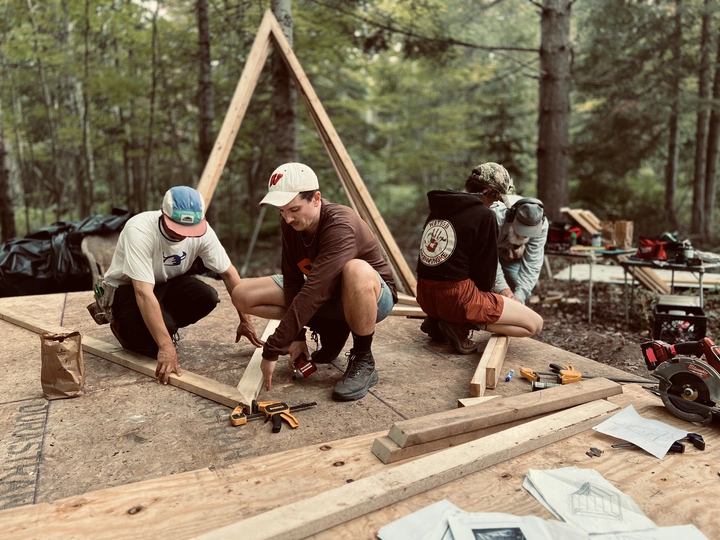Invisible Structures: Building Ourselves Home

I am a carpenter, facilitator, biologist/farmer and eco-social designer currently exploring how collaborative building can surface cultural patterns and create an opportunity to practice reparative, functional alternative ways of being.
My work sits at the intersection of participatory design-build, transformative conflict facilitation, healing intergenerational trauma, deconstructing/constructing culture, and land-based ritual. I’ve led co-building projects across North America and Europe, including Invisible Structures: Building Ourselves Home, a 10-day pilot workshop integrating explicit social agreements into affordable housing construction, and Gstōlt, a participatory mythmaking and co-building project in northern Italy.
My background bridges wood construction, somatic practices, and cultural inquiry. I’ve taught at Yestermorrow Design/Build School, facilitated international workshops on collective leadership and trauma-informed design, and managed the By Design and By Disaster conference on eco-social transformation.
Though my practice is rooted in carpentry and eco-social design, it is inherently collaborative. I work closely with communities and co-facilitators, weaving technical skill with relational scaffolding to create spaces where building becomes both material and cultural work. My interests include participatory housing, cultural repair through embodied practice, and exploring how spatial processes encode social norms.
On every construction site, our social patterns are built alongside the physical structure. Cultural norms like defensiveness and the belief in one right way are transmitted alongside measuring and marking.
This project grew from searching for a holistic method to address our local affordable housing crisis—something that could upskill our community, meet the material need for shelter, and begin to untangle the relational root causes behind the crisis itself.
This project proposes a participatory wood-construction workshop to reveal relational dynamics of social reproduction, using the building process and structure as a mirror for self-reflection.
By integrating intentional social agreements into collaborative construction, we begin to see the cultural habits we unconsciously reproduce.
The method integrates:
1. Embodiment: Hands-on work with tools and timber anchors knowledge in physical experience rather than theory.
2. Carpentry as cultural transmission: Building together is a traditional mode of cultural transmission; the construction process encodes social norms as much as technical skill.
3. Immersive ritual container: The workshop creates a heightened awareness of group dynamics, making behavioural patterns visible in real time.
The goal is to develop pattern literacy—not to change behaviour, but to provide an embodied experience of existing norms and deliberate alternatives.
The project emphasises the visibility of group dynamics as essential for cultural change in spatial practices. Future research will explore rites of passage as a specific ritual technology to move from pattern literacy into transformation.
This approach is highly adaptable to a range of spatial practices, inviting collaboration with architects, designers, and cultural institutions. Through wood self-construction projects, temporary installations, and site-specific building labs, we can explore making culture visible through wood and work.